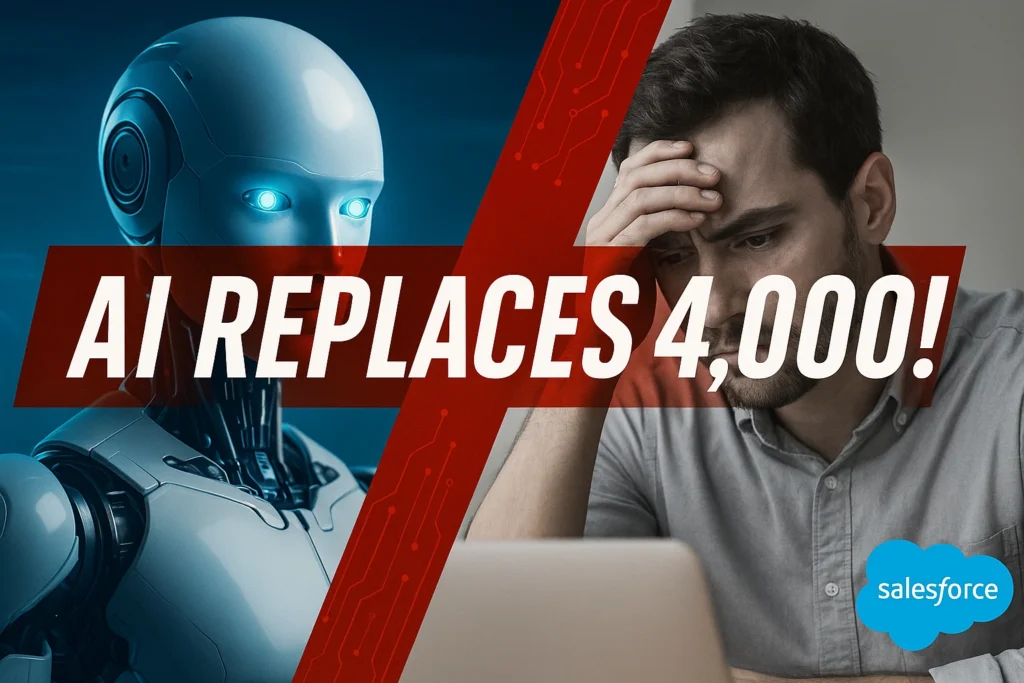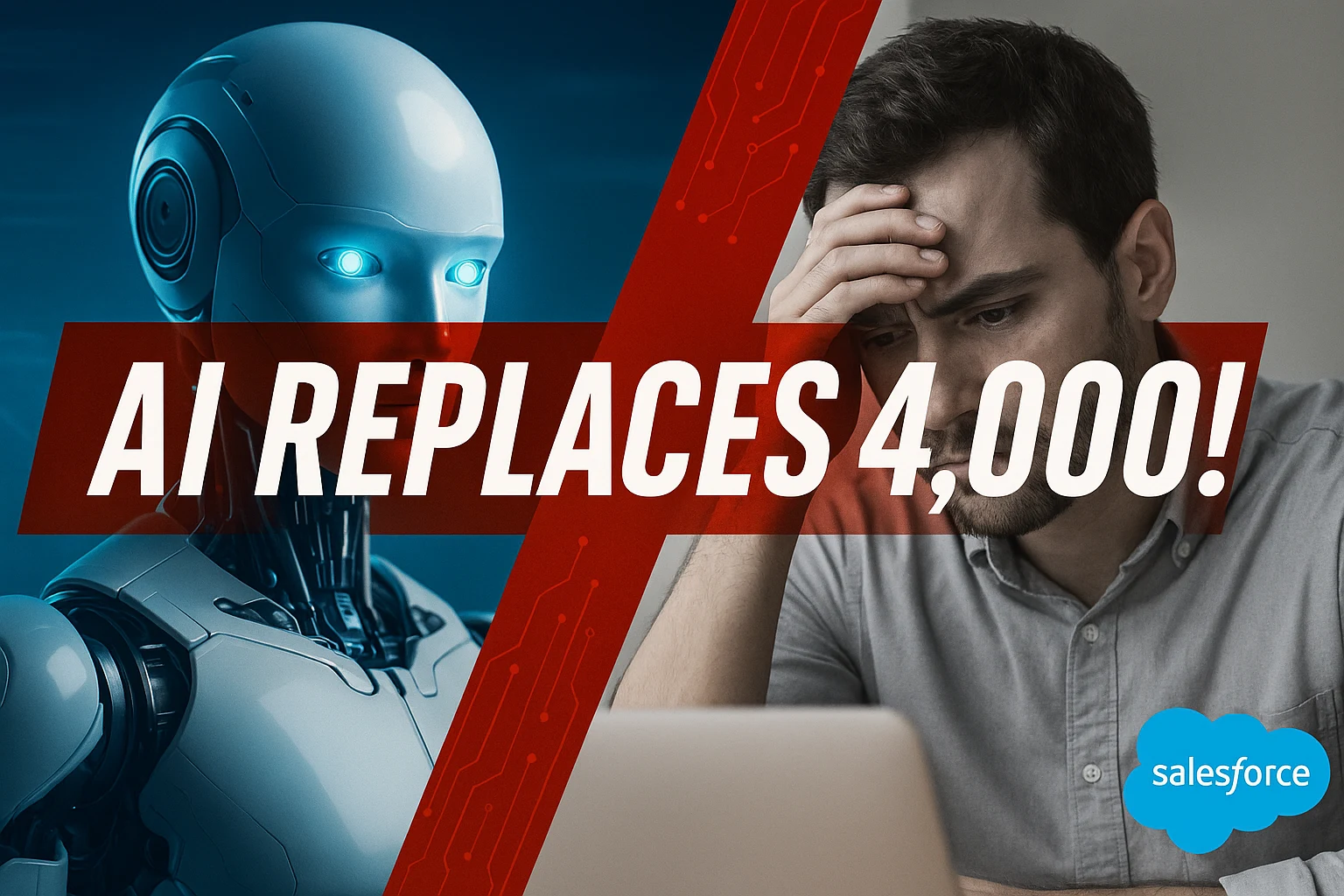How AI is reshaping customer service and what it could mean for your job or daily interactions
What’s Actually Happening
Here’s the deal: Salesforce CEO Marc Benioff recently went on a podcast and straight-up said his company has cut about 4,000 customer service jobs this year because AI is handling more of the workload. He put it bluntly: “I’ve reduced it from 9,000 heads to about 5,000 because I need less heads.” This isn’t some far-off future—it’s happening right now at one of the biggest tech companies in the U.S., and it’s tied to their new AI tool called Agentforce.
So basically, Salesforce rolled out these AI agents at the start of 2025, and they’ve already taken over half of customer conversations. That’s over a million chats handled by bots, with customer satisfaction scores holding steady compared to human reps. Benioff calls it a “rebalance,” shifting folks to sales roles to chase growth.

The Key Findings
Let’s break this down with some real numbers from what Benioff shared. Salesforce didn’t just slash jobs—they saw measurable gains in efficiency. Here’s a quick table showing the before-and-after:
| Metric | Before AI (Early 2025) | After AI (Now) | Change |
| Customer Support Staff | 9,000 | 5,000 | -4,000 (-44%) |
| AI-Handled Conversations | 0% | 50% | +50% |
| Support Costs | Baseline | Reduced | -17% |
| Weekly Leads Processed | Limited by staff | 10,000+ | Massive increase |
| AI Conversations Total | N/A | 1.5 million | New capability |
These stats come directly from Benioff’s chat on The Logan Bartlett Show, where he explained how AI isn’t just assisting—it’s doing the heavy lifting on routine tasks. The company says support cases have dropped, and they’re not backfilling those engineer roles anymore.
Why This Matters to You
If you’re like most folks reading daily news, you might be wondering how this hits home. The thing is, customer service jobs are everywhere—from tech giants to your local bank. With AI stepping in, roles could shift toward more complex problem-solving, but it also means fewer entry-level spots for humans.
Have you ever waited on hold forever? AI could speed that up, making interactions quicker for you as a customer. But on the flip side, if you’re in a service job, this trend might push you to upskill in areas bots can’t touch yet, like empathy or strategy.
5 Things Worth Knowing
- The Scale of the Cuts – Salesforce went from 9,000 support staff to 5,000, freeing up resources to pump into sales. Benioff says this “rebalance” has them calling back every lead—over 10,000 a week now. That’s a huge boost for business growth.
- How AI Actually Works Here – Agentforce breaks down tasks into steps, handling chats like a self-driving car that hands off to humans when it gets tricky. It’s already managed 1.5 million conversations with CSAT scores matching human levels. Pretty wild when you think about it.
- Not All Jobs Vanish – Hundreds of employees got redeployed to sales, professional services, and customer success roles. So it’s not pure layoffs—more like internal shuffling to chase bigger opportunities.
- Benioff’s Flip on AI – Just months ago, he was saying AI would “augment” people, not replace them. Now? He’s all in on making Salesforce an “agentic enterprise,” predicting half of all conversations could be with AI agents next year. This shift shows how fast tech is evolving.
- Broader Industry Ripple – This isn’t just Salesforce. Companies like Klarna and Microsoft are doing the same, cutting service roles as AI takes over routine stuff. If you’re job hunting, keep an eye on AI-proof skills like creative thinking.
The Real Impact
Here’s what’s interesting: Benioff doesn’t see this as dystopian—he calls it “reality.” For Salesforce, it’s meant lower costs (down 17%) and better lead follow-up, which could mean faster service for users. But let’s be real—4,000 jobs gone is a big deal, especially in a tough economy.
On the positive side, AI is opening doors for small businesses and entrepreneurs by making tools more accessible. The downside? It could widen the skills gap, leaving some workers behind if training doesn’t keep up. Overall, this feels like the start of a bigger wave in how companies blend humans and tech.
Bottom Line
Salesforce’s AI job cuts show AI isn’t just hype—it’s already changing workplaces. If you’re in customer service, start exploring AI tools to stay ahead. For everyone else, expect smoother support experiences, but remember: humans still handle the tough stuff.
Further Reading
- Salesforce CEO says AI has replaced 4,000 jobs at his company – Deep dive from the San Francisco Chronicle.
- Benioff on cutting customer service roles with AI – Yahoo Finance breakdown with quotes.
- Salesforce AI agents replace support jobs – Seeking Alpha’s take on the business angle.
- Listen to the full podcast episode with Marc Benioff – The Logan Bartlett Show for the original interview.
- How AI is impacting tech jobs industry-wide – KTVU report on similar moves at other companies.
- Salesforce’s Agentforce explained – Official site for more on the AI tech.
- Broader AI job displacement trends – NBC Bay Area on the Bay Area impact.
Key Takeaways
- AI at Salesforce has slashed 4,000 support jobs but boosted efficiency and lead handling.
- Expect more hybrid human-AI teams—50/50 now, potentially more bot-heavy soon.
- Upskill in areas like sales or strategy to adapt; companies are redeploying talent there.
- This trend is spreading—watch for it in your industry and consider AI training options.

